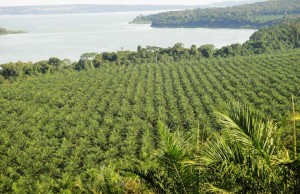Government says palm oil production delivers positives
April 3, 2018—The government has told off environment lobbyists and those against the continued expansion of palm oil production in Uganda to look at the brighter side instead of consistently criticising efforts to make the country self-sufficient in vegetable oil. Uganda has been growing the commodity on a commercial scale since the early 2000s mainly in the lake district of Kalangala.
Vincent Ssempijja, the agriculture minister, was recently launching an evaluation report of the Vegetable Oil Development Project( VODP) Phase II and said household incomes have gone up.
“Under the oil palm component, 6,500 hectares have been planted by the nucleus estates in Kalangala which is 100% of the target. Small holder farmers have planted so far 4,424 hectares of palm oil trees which is 94%.This has enabled the net farm income from palm oil project to the farmers to go up to an average of $1384 per hectare per year.
The VODP II started in October 2010 and its being implemented by the Ministry of Agriculture Animal industry and Fisheries over an eight-year period with completion set for the end of the year. The total cost of the project is $147.2 million and its major objective is to increase the domestic production of vegetable oil and its by-products thus raising the farmers incomes and also ensure there is constant supply of affordable vegetable oil products to Ugandan consumers. The largest private sector player in the industry is Bidco Uganda Limited who have been around for more than 10 years.
Ssempijja said, “The project has not only benefited farmers, but the districts at large because of the infrastructure developments which are associated with the projects such as piped water, solar energy and construction of about 250 kilometres of farm roads.”
According to the report, the project has contributed to increased capacity building in Kalangala especially for the growers of oil palm trees. There have been recorded improvements in book-keeping while farmers have also been trained in group formation and cohesion to increase their bargaining power. Women have been especially targeted as a way to improve livelihoods.
Ssempijja said before the project, many islanders from Kalangala and Buvuma were depending on fishing and charcoal burning. However growing palm oil trees has provided higher earnings.
On the other hand, environmental groups like Friends of the Earth say palm oil production steadily degrades the soil and depletes forest cover over wide areas which leads to destroyed eco-systems.
The report states although farmers are largely satisfied with the project, there are concerns over limited access to quality pesticides and problems with weeding the trees. Millers report an increase in the supply of raw material from crushing since VODP II has linked them to more farmers. Millers have also benefited from the project inform of improved skills in production of quality vegetable oil.

 African Heads of state head to South Korea next week for Summit talks
African Heads of state head to South Korea next week for Summit talks
 Trading leads as main source of income for Ugandans
Trading leads as main source of income for Ugandans
 New leadership for bankers’ umbrella as total assets top $12 billion
New leadership for bankers’ umbrella as total assets top $12 billion
 Brussels Airlines to announce Nairobi service
Brussels Airlines to announce Nairobi service
 SITA promises enhanced travel experience after Materna acquisition
SITA promises enhanced travel experience after Materna acquisition
 Saudia’s 105 aircraft order stretches A320neo lead over rival Max
Saudia’s 105 aircraft order stretches A320neo lead over rival Max
